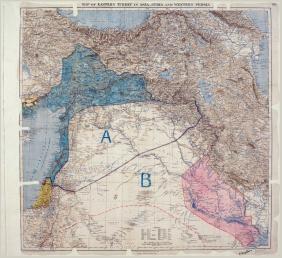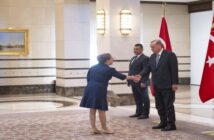100 years ago, the so-called Sykes-Picot Agreement was signed between Britain and France. It marked the division of the floundering Ottoman Empire into spheres of British and French interests.
Pointing to a map before him to designate areas of interest, British diplomat Sir Mark Sykes declared alongside his colleague Francois Georges-Picot: ‘’I should like to draw a line from the ‘’e’’ in Acre (on the Mediterranean coast) to the last ‘’k’’ in Kirkus (in modern city in Iraq).
Territory north of the line would come under French protection, directly or indirectly, and territory to the south would be controlled directly or indirectly by the British.
France would take control of a ‘’Blue Zone’’ including Lebanon, the Syrian coast and parts of what is today Turkey.
The ‘Red Zone’’ for Britain included southern Mesopotamia, or Iraq including Baghdad, along with the Mediterranean ports of Haifa and Acre.
Between the two, an Arab State or a confederation o Arab states was to be created under French and British protection. Palestine, including Jerusalem, was designated by the colour brown and was to be under an international administration.
The accord was struck a year before the so-called Balfour Declaration which contained a promise of a ‘’national home for the Jewish people. ’’
A political powder keg
Today, 100 years after the Sykes-Picot pact was signed the Middle East is a political powder keg and the location of several conflicts. It’s a result of this arbitrary division by outside powers.
The division into zones of influence did not take into consideration the local peoples. Democgraphic, socio-cultural and religious aspects were not taken into account by France or Britain. Several Arab tribes, though nomadic, found themselves separated and dispersed into different states. They strongly rejected the central government. Over the years, the region was shaken by internal uprisings, coups and revolts that continue to this day….
Today, as we see, across the region from Libya to Syria, authority has collapsed and people are reaching for their old identities : Sunni, Shiite, Kurds… Sectarian groups, often Islamist, have filled the power vacuum, spilling over borders and spreading violence.
The Arab-Israeli conflict is not the only outstanding and core issue in the region as some argue. As Israeli diplomat and writer Freddy Eytan from the Jerusalem Center for Public Affairs (JCPA) recalls, 23 conflicts have been recorded in the region.
‘’Today, the Middle East has become a political powder keg and the setting for successive armed conflicts. The greatest challenge to the legacy of the Sykes-Picot agreement comes from Radical Islam which denies the idea of nationalism in general. They believe in reviving the Islamic Ummah (nation) as one political entity that should be governed according to Shariah, the Islamic law.’’
All the unrest in the Arab world is internal, social, religious and tribal.
Today, only Israel emerges as a democratic and stable country in the region.
Danger to impose a solution to people
As France is pushing with its initiative to convene an international conference aimed at reviving Israeli-Palestinian peace talks, the Sykes-Picot agreement is a stark reminder of the danger to impose a solution to people. Israel is considering the French initiative with a lot of skepticism because it has traditionally opposed international conferences out of concern that they invite unfair pressure from different sides around the table.
For Israel, only direct bilateral talks with the Palestinians is the only way to get a negotiated solution to the Israeli-Palestinian conflict. Israeli Prime Minister Benjamin Netanyahu repeated this message last week to visiting Belgian and Foreign Ministers Didier Reynders and Jean-Marc Ayrault.
‘’It would be much easier for (Palestinian Authority President) Abbas to come to Jerusalem to meet Prime Minister Netanyahu, rather than set up this multi-state entreprise in Paris, which I don’t think gets us any closer to a negotiated solution, and in fact makes a negotiated solution mor distant,’’ Dore Gold, Israel’s foreign ministry director-general, told The Jerusalem Post, in a reference to the French plan to organise end of this month a conference of some 20 Foreign Ministers and organisations to discss parameters of an Israeli-Palestinian agreeement.
According to him, there are ‘’different international actors’’ who are keen on wanting to enunciate beforehand the parameters of a peace settlement. Israel’s problem with that is that those parameters may not take into account Israel’s vital security interests in an environement marked by chaos like in Syria. Avoiding international involvement is also the reason why Israel’s cabinet recently convened in the Golan Heights and declated that Israel has no intention of ever withdrawing from the plateau to find out that their new ‘’neighbours’’ would be terrorists from Al-Nusra or ISIS. A disaster in terms of Israel’s security.
Israeli leaders regularly recall to their interlucotors that the peace treaties it signed with two major Arab countries, Egypt and Jordan, were through direct negotiations.
Today as Israel finds a confluence of interests in the region with states such as Egypt, Jordan, Saudi Arabia and some Gulf countries, in fighting radical islam and Iranian nefast influence, reaching accomodations with them could help find a solution to the Palestinian issue because they might push the Palestinians to show some flexibility.
‘’You don’t have to be an international diplomat to imagine that it is very possible that in the basement of one of the chancelleries in Europe or elsewhere, there is a modern Sykes-Picot sitting down and trying to imagine how the Middle East will be divided in the future,’’ says Dore Gold.
Yossi Lempkowicz is Editor-in-Chief of European Jewish Press and Senior Media Advisor of Europe Israel Press Association.





